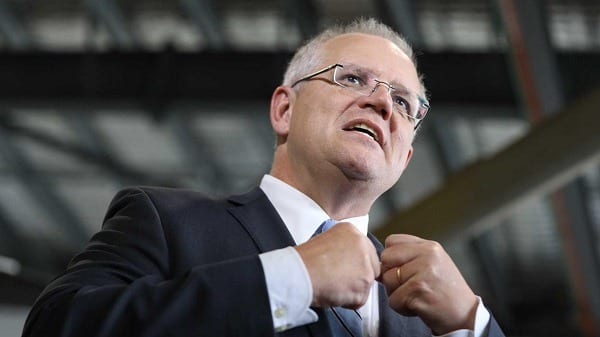On Tuesday night, a story broke in the Sydney Morning Herald/ The Age that, while shocking, was hardly surprising.
Reporter Eryk Bagshaw told the story of two women in the Liberal Party, Chelsey Potter and Dhanya Mani, who allege they were sexually assaulted while working for senior Liberal politicians. Both made complaints that they say were dismissed or ignored.
It is infuriating that it has taken so long for such stories, revealing a culture of sexual harassment and assault in politics, to appear in the Australian media, nearly three years after #MeToo created seismic waves in political circles elsewhere in the world.
Yet here in Australia these stories are still being met by those with the power to do something with woeful indifference.
Yes, this story made the front page, and Bagshaw and his employers at the SMH/Age should be proud of the role they have played in bringing these stories to light. It’s significant given the extent to which Australia’s defamation laws make reporting such stories difficult and the chilling effect Geoffrey Rush’s multi-million dollar defamation payment has, no doubt, had.
Potter and Mani deserve praise too for speaking out publicly, given how other women caught in the crossfire of Australian politics and #MeToo to date have become collateral damage.
Who can forget Tessa Sullivan being slut shamed in the pages of the Herald Sun as former Melbourne Lord Mayor Robert Doyle’s supporters sought to intimidate her into remaining silent?
Or Catherine Marriott’s identity being leaked to the media within days of a confidential complaint she made to the National Party about Barnaby Joyce?
Or the case of ABC journalist Ashleigh Raper, whose allegation that the former NSW Labor Leader Luke Foley groped her at a Christmas party being made public without her consent by one of Mr. Foley’s political adversaries using Parliamentary privilege.
Why has Australia’s #MPToo been so slow to gather pace?
Nearly three years ago, in the early days of #MeToo, I became personally frustrated that while sexual harassment and assault allegations were felling one political beast after another in both the US and the UK, countries where I have lived, whose politics and news I still follow closely, here in Australia … relative crickets.
Was it because there was nothing to see here, or was something else going on?
I decided to take a closer look.
After making it known that I was interested in writing about sexual harassment in Australian politics, I heard many, many shocking stories. But I couldn’t report them for a few reasons. Defamation, yes. But, also, because, at the time, no one wanted to go on the record — a decision I respected and understood.
When I inquired among a few press gallery correspondents as to why such stories were not gaining traction, I was shocked when one, hearing my American accent, said somewhat condescendingly:
“Kristine, this is not the US. We have an understanding within the media that private lives are private.”
But I was not talking about private, consensual, sexual relationships. I was talking about sexual harassment and assault: things that aren’t “private” but rather matters of public interest. At least they should be.
In the absence of being able to publish specific allegations, and against a backdrop of some feeling that sexual harassment and assault in the workplace was a “private” matter, I decided to look ahead.
In both the US and the UK, sexual harassment scandals prompted many to look anew at the policies and processes in place to protect political staffers, all of which were grossly inadequate and since have been changed.
In an exclusive investigation for Women’s Agenda, I revealed that Australia’s policies covering political staffers were likewise inadequate – “incomprehensible” was the word one leading employment lawyer used.
The response from the Department of Finance was underwhelming: a puzzling indifference given the likelihood such stories would eventually come to light and expose the shortcomings. Here was a chance to get out ahead of a scandal!
More than two years later, I’m disappointed to report that while some changes were made to the relevant policies and procedures covering political staffers in response to that report, they remain inadequate. They do not explicitly state avenues for allegations of sexual assault and do not cover members of the party who are not employed in Parliament.
I am also disappointed that there remains an entrenched indifference among those with the power to do something, in particular by offering a fair and transparent independent complaints procedure. At the end of the day, that’s what Potter and Mani are asking for.
The response from Prime Minister Scott Morrison’s office to their allegations, that they should “contact the police”, isn’t good enough.
When the Australian Human Rights Commission releases the findings of its world first National Inquiry into Sexual Harassment in October, an inquiry this Coalition Government commissioned, I seriously doubt the gold standard for internal policies and procedures regarding sexual harassment and assault at work will be advising complainants to “contact the police”.
In the nearly three years since #MeToo exposed shocking levels of sexual harassment and assault in all workplaces, including political workplaces, Australia’s political leaders have had ample opportunity to show leadership, first and foremost by getting their own house in order.
Time is ticking. Continued failure to do so is the worst kind of hypocrisy.
Potter and Mani have started a network for those who have been sexually harassed in political workplaces to come forward and share their stories.
While laudable, my question for Morrison and the leaders of all political parties is this. How many more women need to flay themselves publicly before those with the power to do something take action?
Kristine Ziwica tweets @KZiwica


